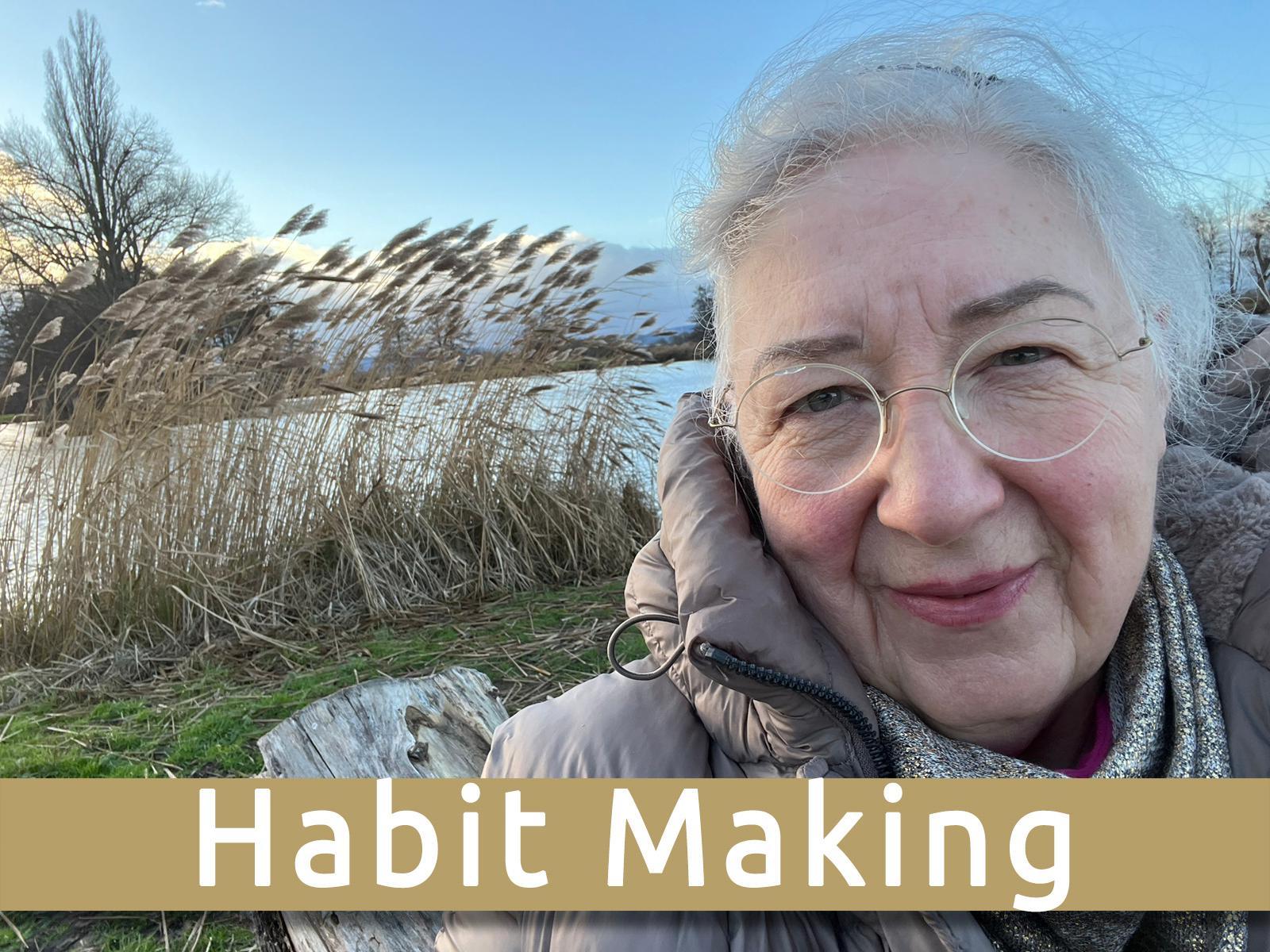
Habit Making
I am currently on Day 15 of my habit making concerning my Biohacking ambition to getting healthy in 2023. Just writing this is making me accountable – first to me! Comer rain or come shine I have been out there and continue to do so…Glennon Doyle and Amy Wambach keep telling me: „We can do hard things!“ You can say that again! Promising these habits, this routine to myself has me pushing through and keep up even if it is one small step at a time. And….I can feel myself changing from the inside out…even after just 15 days!
Habits are are about identifying ourselves and habits are a means to achieving this badass goal! It is about who I am in that moment and not about what I am doing as I kick-ass walking through the wind and rain with my knees aching and stumbling on the ruts!
If you are having trouble creating habits, then join me in my journey and get inspired! Allow me to share some fantastic habits here for singers and speakers and people who want to feel better with every BREATH they take – they are game-changer habits. Set some sweet intentions and take each day as it comes. What a privelage to be alive!
CONTENT in this Blog:
1. Introduction to Habits
2. Breath-taking…
3. Hummmmm-blebee
4. Lip-Buzz Siren / Tip-Tongue Rolls
5. SING
6. Here is the deal
Introduction to Habits
Habits are the foundation of our daily lives. They shape our behavior and dictate how we spend our time and energy and our resources. When it comes to making positive changes in our lives, developing „healthy“ habits is key!
Why is habit forming so important?
- Habits allow us to automate certain tasks and behaviours. This in turn frees up our mental energy and allows us to focus on other things. By turning healthy singing behaviours into habits, we can make them a natural part of our daily vocal routine without having to constantly remind ourselves to do them, like supporting, for example.
- Habit forming is important because it can help us overcome barriers and obstacles that might otherwise prevent us from making positive changes. For example, if we want to start practising regularily but struggle to find the time and/or motivation to do so, turning out practising into a habit can help us overcome the challenge of procrastination. By making singing practise a regular part of our daily routines (like making your bed and high-fiving yourself in the mirror mornings) it becomes easier to stick with it, even on days when you don’t feel like it.
- Habits have a powerful psychological effect on our behavior. When we repeat a healthy behaviour over time, our brain starts to associate it with a sense of reward because repeating a beneficial excercise in singing amkes it easier and better and the reinforcement can help us to develop a stronger desire to continue the behavior until it becomes a habit – it is in our muscle memory (if you sing something over and over again your brain will remember the action. This is called building up your „muscle memory“, meaning that the muscles get used to responding in a certain way and will learn to function automatically in the future. It is important, therefore, to establish healthy routines). For example, when we repeat a vocal excercise 3 – 5 times we reinforce it in our muscle memory and can pick it up when needed. So if you are looking to make positive vocal behavior, focus on developing healthy habits. Be consistent. One step at a time and gradually biulding. With time and effort you can develop the habits you need, to sing with a stable and healthy voice.
Breath-taking…
Box breathing: is a deep breathing technique. It works by distracting your mind as you count to four, calming your nervous system, and decreasing stress in your body. A simple, but powerful relaxation technique that can help return your breathing pattern to a relaxed rhythm. It can clear and calm your mind, improving your focus. Exhale through your mouth to a count of 4, hold your lungs empty for a count of 4, inhale through your nose to a count of 4, and hold the air in your lungs for a count of 4 before exhaling and beginning the pattern anew. Box breathing can reduce stress and improve your mood. That makes it an exceptional treatment for conditions such as anxiety, panic, and performance stress.
Hummmmm-blebee
Humming: is one of the best all-around vocal exercises. This technique helps stretch the vocal cords, relaxes your facial muscles, and improves breathing. Humming also develops your vocal resonance and tone quality. Just for a change: try humming on “n” instead of “m” – feel how that resonates above the tongue in the upper cavity of your mouth and at the same time feel how your vocal tract (made up of the whole mouth cavity, from the vocal cords to the nasal passages) and throat are open and free.
Lip-Buzz Siren / Tip-Tongue Rolls
Daily Vocal Brush-ups: Lip Buzz: simply vibrate your lips together without pitch, at first. This will help build up your breath support. Next, add a pitch to your lip buzz, and hold it anywhere from 3-5 seconds connecting your breath support to your voice placement. Pitch can go up, down, or stay on one note. If you have trouble making the buzzing sound, you can place your index fingers on the center of your cheeks to give your lips more “slack.” You can achieve the same effect by rolling your tongue. This is called a tongue trill.
The Siren: Think of the sound of a fire engine passing by, and imitate it with your voice. Start at the lowest note in your range, and slide through every note to the top of your range and back down again on Liprolls and Tongue-Tip Rolls and then on whichever vowel you prefer.
Once you get in the habit, you’ll love the freedom and flexibility of a brushed-up voice.SING
Singing on pitch is a „No pressure affair! A.) Practise „hearing awareness“ and learn to recognise and sing intervals B.) Practise singing a note on „oo“ and finding it on the piano…then do the opposite and sing the note after playing it on the piano, matching the pitches „spot on!“ C.) Practise singing the notes between the intervals from low to high and vice versa. D.) Practise recording your singing and listening with awareness! E.) Practise regularily…daily if possible…for short intervals of 15 – 30 Minutes F.) Be assured, that nothing can take the place of a trustworthy Vocal Coach.
Mee, May, Mah, Mo, Moo: 11111,1111,54343,1234,54314 – Start at middle C, and sing the excercise in Minor chromatics up the scale. Take your time and then choose a tempo in which you can sing this exercise all in one breath. Focus on your intonation to create the best vocal sound. Don’t push – sing nice and relaxed. (Credits: C. Porter)
Here‘s the deal…
Singing is definitely a HIGH PERFORMANCE “sport” and like all athletes, we singers definitely have to allow ourselves the necessary luxury of a coach! Vocal biohacking is a game changer! Intensive Vocal Training. Designed to unleash your vocal superpowers! Are you determined to make your vocal dreams a reality? Your heart says yes, but your vocal range says no? Don’t know where to start cross-training your voice? Would you like to go from “about knowing” to smart “badass” singer on stage? You want to go from insecure to unstoppable!
Are you ready to step out of your comfort zone and into your genius zone? If this applies to you, there are probably even more reasons why this introduction to vocal biohacking fits right in with your transformation! You’re worth it!
https://vocalsuccessstudio.de/vocal-biohacking-success-course
May all that has been reduced to noise in you, become music again!



